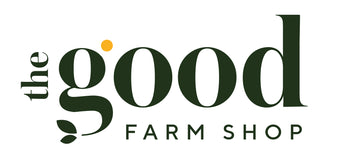Why Protein Is Essential for the Human Body
Hi, I'm Sammy Truswell...
Your Good Farm in-house nutritionist. Here to bring you essential information on nutrition, diet and permaculture gardening - in a bite size, easy to understand, science-backed way.

This month we are deep diving PROTEIN!
Why Protein Is Essential for the Human Body
When most people think of protein, muscle is usually the first thing that comes to mind. Whether its athletes guzzling protein shakes or gym-goers loading up on chicken and eggs, protein is widely seen as the go-to nutrient for building strength and bulk. But while muscle growth is a key role of protein, it’s just one part of a much bigger picture.
The Real Role of Protein in the Body
Protein is much more than a muscle-builder. It’s a fundamental part of every single cell in the human body. From the tips of your hair to the enzymes inside your cells, protein is working around the clock to keep you alive and functioning.
Here’s how far-reaching its role really is:
Brain and Mood
Protein provides the raw materials for neurotransmitters, the brain chemicals that influence how you think, feel, and focus.
Immune System
Your immune cells rely on protein to build antibodies and repair damage — helping you fight off colds, bugs, and whatever else life throws your way.
Structure and Repair
From muscle fibres to your skin, hair, and bones — protein is the body's building material, keeping everything strong, supported, and able to heal when needed.
Blood Sugar and Energy
Protein helps steady your blood sugar levels, preventing energy spikes and crashes — and making you less likely to face-plant into a biscuit tin by 3pm.
Metabolism and Hormones
Protein supports the enzymes and hormones that drive digestion, regulate your metabolism, and keep systems running smoothly behind the scenes.
Weight Management
Protein helps keep you full, reduces cravings, and protects lean muscle while losing fat — a powerful combo for sustainable weight management.
Transport and Balance
Proteins act as couriers in your bloodstream, delivering oxygen and nutrients while helping maintain fluid and pH balance across your body.
In short, protein is not just important—it's indispensable.
What Happens When You Don’t Get Enough?
Not getting enough protein can quietly affect your health in ways that build up over time. While some symptoms may seem minor at first, ongoing deficiency can lead to more serious consequences. Here are some common signs your body may not be getting the protein it needs:
Muscle Loss and Weakness
Without sufficient protein, the body may start breaking down muscle tissue to meet its basic needs, resulting in reduced strength, physical endurance, and overall muscle tone.
Fatigue and Persistent Hunger
Protein helps regulate energy levels and appetite. Low intake can lead to sluggishness, difficulty staying full after meals, and frequent cravings — often causing overeating or constant snacking.
Slow Healing and Recovery
Protein plays a critical role in tissue repair. Cuts, bruises, and injuries may take longer to heal when your intake is too low.
Weakened Immune Function
A lack of protein can impair the body’s ability to produce and repair immune cells, making you more prone to illness and slower to recover.
Changes to Hair, Skin, and Nails
Thinning hair, brittle nails, and dry or dull skin can all be signs that your body is prioritising essential functions over cosmetic ones due to limited protein.
Mood and Cognitive Changes
Without enough protein to support brain function, you may experience increased irritability, low mood, brain fog, or difficulty concentrating.
Impaired Growth in Children
In children and adolescents, protein is vital for growth and development. A deficiency can affect height, cognitive development, and overall physical health.
The Bottom Line
Protein is a life-sustaining substance that every person needs, every day. It keeps your body running, repairs damage, fights illness, and quite literally forms the building blocks of who you are.
Recognising the importance of protein is one thing but figuring out exactly how much you need is a different matter entirely.
So, the question is: are you getting enough?
Stay tuned for Part 2: Understanding Your Individual Protein Requirements, where we’ll help to break down how to calculate your daily needs based on your body, lifestyle, and health goals. (We'll pop it in the next nutrition edit newsletter)
Until then, stay well and. happy...
Sammy




















Have you listened to Dr Christopher Gardner interviewed on Zoe?
Hi Sammy,
I’m so looking forward to your post’s, I’m ready to learn more about protein
Thank’s 😊🌸
Leave a comment